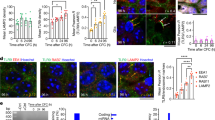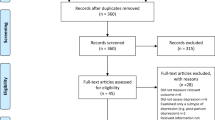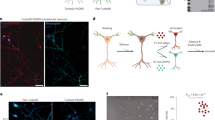Abstract
Some individuals maintain high cognitive functioning at older ages. Here we show that mechanisms for long-term depression differ in aged rodents that maintain cognitive performance compared to young adults. Our results imply that cognitive abilities may be sustained in aged individuals by a switch in synaptic plasticity mechanisms.
This is a preview of subscription content, access via your institution
Access options
Subscribe to this journal
Receive 12 print issues and online access
$209.00 per year
only $17.42 per issue
Buy this article
- Purchase on Springer Link
- Instant access to full article PDF
Prices may be subject to local taxes which are calculated during checkout


Similar content being viewed by others
References
Cabeza, R. Psychol. Aging 17, 85–100 (2002).
Barnes, C.A. Phil. Trans. R. Soc. Lond. B 358, 765–772 (2003).
Gallagher, M., Burwell, R. & Burchinal, M. Behav. Neurosci. 107, 618–626 (1993).
Nicholson, D.A., Yoshida, R., Berry, R.W., Gallagher, M. & Geinisman, Y. J. Neurosci. 24, 7648–7653 (2004).
Nicolle, M.M., Colombo, P.J., Gallagher, M. & McKinney, M. J. Neurosci. 19, 9604–9610 (1999).
Reyes-Harde, M. & Stanton, P.K. Neurosci. Lett. 252, 155–158 (1998).
Kirkwood, A., Rozas, C., Kirkwood, J., Perez, F. & Bear, M.F. J. Neurosci. 19, 1599–1609 (1999).
Norris, C.M., Korol, D.L. & Foster, T.C. J. Neurosci. 16, 5382–5392 (1996).
Huber, K.M., Roder, J.C. & Bear, M.F. J. Neurophysiol. 86, 321–325 (2001).
Auerbach, J.M. & Segal, M. J. Physiol. (Lond.) 492, 479–493 (1996).
Arundine, M. & Tymianski, M. Cell. Mol. Life Sci. 61, 657–668 (2004).
Lynch, D.R. & Guttmann, R.P. J. Pharmacol. Exp. Ther. 300, 717–723 (2002).
Husi, H., Ward, M.A., Choudhary, J.S., Blackstock, W.P. & Grant, S.G. Nat. Neurosci. 3, 661–669 (2000).
Sattler, R. et al. Science 284, 1845–1848 (1999).
Acknowledgements
This work was supported by a US National Institutes of Health grant (NIA PO1AG09973) to M.G. and A.K.
Author information
Authors and Affiliations
Corresponding authors
Ethics declarations
Competing interests
The authors declare no competing financial interests.
Supplementary information
Supplementary Fig. 1
LTD induced by 1 Hz (15 min) protocol is NMDAR- and PLC-dependent in young adults. (PDF 110 kb)
Rights and permissions
About this article
Cite this article
Lee, HK., Min, S., Gallagher, M. et al. NMDA receptor–independent long-term depression correlates with successful aging in rats. Nat Neurosci 8, 1657–1659 (2005). https://doi.org/10.1038/nn1586
Received:
Accepted:
Published:
Issue Date:
DOI: https://doi.org/10.1038/nn1586
This article is cited by
-
Fusion transcripts in normal human cortex increase with age and show distinct genomic features for single cells and tissues
Scientific Reports (2020)
-
Age-related shift in LTD is dependent on neuronal adenosine A2A receptors interplay with mGluR5 and NMDA receptors
Molecular Psychiatry (2020)
-
Susceptibility to Aβo and TBOA of LTD and Extrasynaptic NMDAR-Dependent Tonic Current in the Aged Rat Hippocampus
Neurochemical Research (2019)
-
mGlu5 receptors and cellular prion protein mediate amyloid-β-facilitated synaptic long-term depression in vivo
Nature Communications (2014)
-
Aberrant light directly impairs mood and learning through melanopsin-expressing neurons
Nature (2012)



